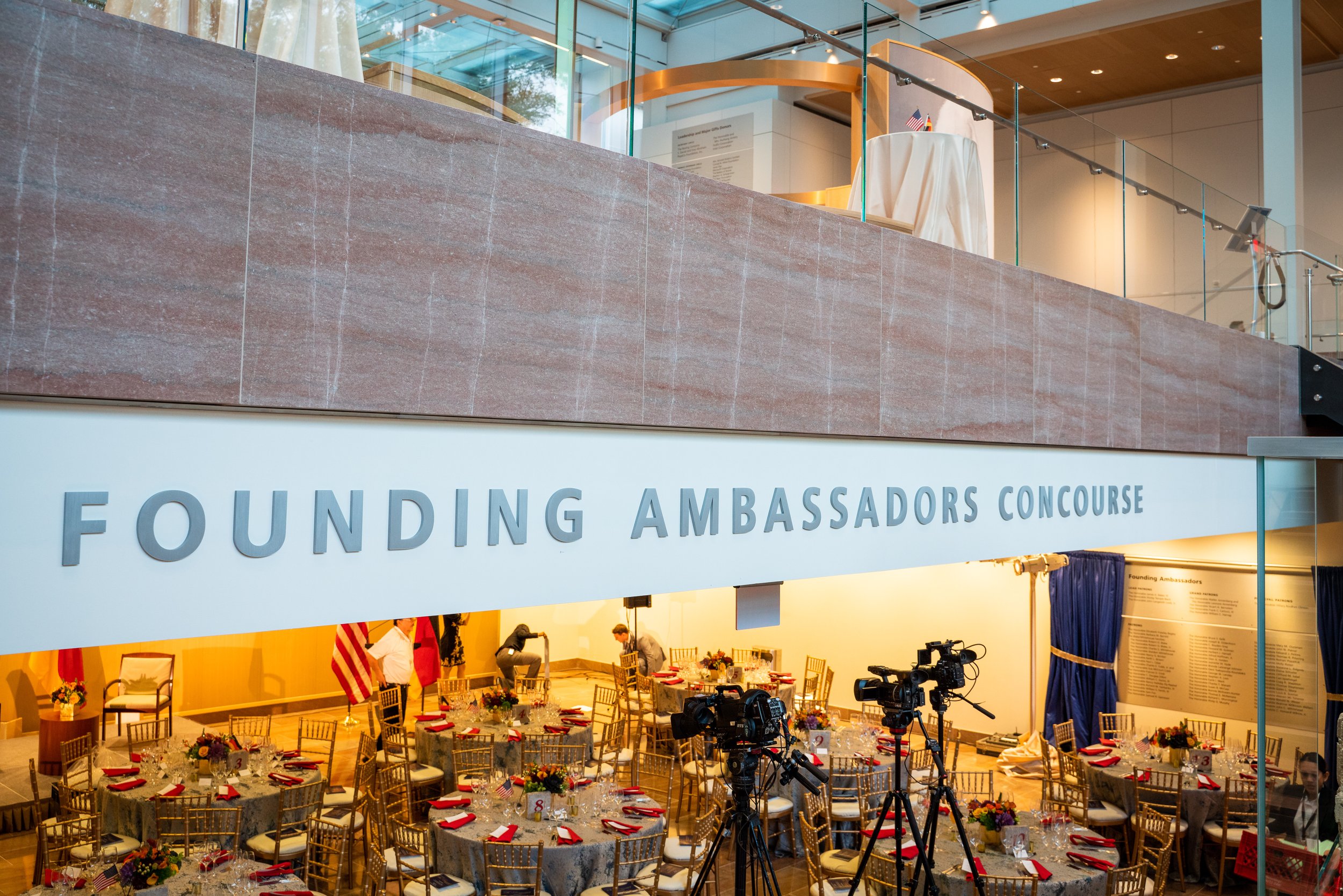
Events
Celebrating diplomacy with our donor family.
Past Events

Mathias of Maryland
Join the Diplomacy Center Foundation at DACOR Bacon House as Frederic B. Hill, former correspondent for The Baltimore Sun and foreign affairs director for Senator Mathias in 1985 and 1986, marks the publication of Mathias of Maryland, a collection of essays on the life and career of “a Lincoln Republican in the Senate”, co-edited with Monica Healy, former senior legislative assistant for Senator Mathias. Joining the conversation, and a contributor to the book is Casimir Yost, adjunct professor in the School of Foreign Service at Georgetown University and Senior Fellow at the Institute for the Study of Diplomacy.
Senator Charles “Mac” Mathias was a lifelong Republican who won every election in a 26-year congressional career in heavily Democratic Maryland. A courageous risk-taker, Mathias led efforts to advance civil rights, voting rights, environmental initiatives to clean up the Chesapeake Bay, and establish the Vietnam Veterans Memorial. On foreign policy, he was an early critic of the Vietnam War and a consistent advocate for nuclear arms control, Middle East peace and sanctions against apartheid South Africa.
His story, captured here by senior staff members, members of Congress and others, is an inspiring example of what a courageous political leader can do when he follows his conscience and acts on principle. His remarkable career is a stark reminder of the days when the Republican Party stood for the rule of law, respect for the Constitution and a bipartisan foreign policy.
Meet the Panelists:
Frederic B. Hill
Frederic B. Hill was a foreign correspondent and editorial writer for The Baltimore Sun, from 1965 to 1985, including six years covering Western Europe and southern Africa. In 1985 and 1986, he served as foreign affairs director to Sen. Charles “Mac” Mathias (R., MD), and assisted the senator on a number of path-breaking legislative achievements, including the U.S. sanctions against South Africa's apartheid regime.
From 1986 to 2006, he helped establish and then led the Office of Special Programs at the Foreign Service Institute of the Department of State. The office conducted policy planning (gaming) exercises on national security, economic and global issues for the department and interagency community.
Hill is the author or editor of six books, including the recently published Mathias of Maryland; Remembering a Lincoln Republican in the Senate. Earlier books included Ships, Swindlers and Scalded Hogs, the Rise and Fall of the Crooker Shipyard in Bath, Maine and The Life of Kings; The Baltimore Sun and the Golden Age of the American Newspaper. Other books include A Flick of Sunshine, The Remarkable Shipwrecked, Marooned, Maritime Adventures and Tragic Fate of an American Original and Dereliction of Duty, a collection of his columns for leading newspapers on the first presidential term of Donald J. Trump.
He is a member and former president of Maine's First Ship, an organization that built a reconstruction of the first vessel built by English settlers in North America, at Popham Beach, Maine, in 1607-08.
Casimir Yost
Casimir Yost is an adjunct professor in the School of Foreign Service at Georgetown University and Senior Fellow at the Institute for the Study of Diplomacy, also at Georgetown. He directed the Institute from 1994 to 2008. From 2009 to 2013, Mr. Yost served on the National Intelligence Council directing its Strategic Futures Group. Prior to Georgetown he was president of the World Affairs Council of Northern California and director of the Center for Pacific Affairs in the Asia Foundation in San Francisco.
Mr. Yost served on the staff of the US Senate from 1977 to 1986 first in the personal office of Senator Mathias and then on the Senate Committee on Foreign Relations. Prior to working on the Hill, he worked for First National City Bank of New York in Lebanon, Pakistan, Saudi Arabia and Tunisia.
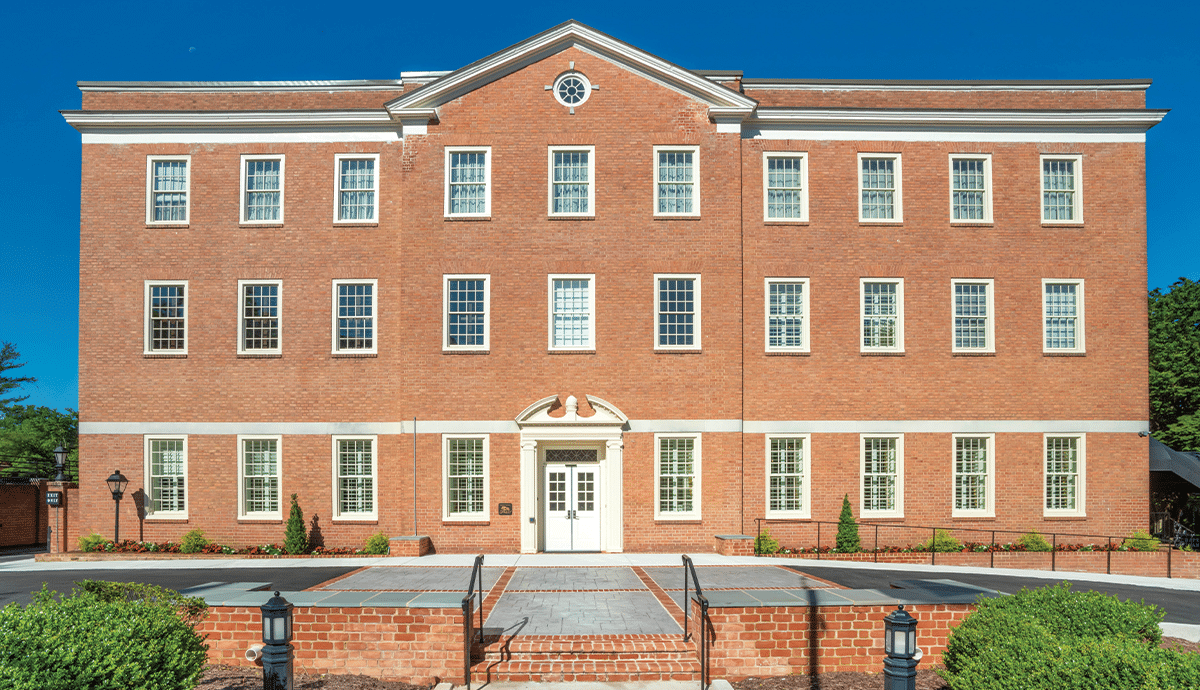
1st Annual Diplomacy Gala
Joseph Gawler’s Sons
Ticketing opens April 9, 2022, at 9:00 am ET
The 1st Annual Diplomacy Gala is an intimate and luxurious evening hosted by Joseph Gawler’s Sons in support of the Diplomacy Center Foundation. Join us for an evening exploring the essential relationship between the diplomatic community and our nation’s chief diplomat. The evening will include a seated dinner and program, followed by a dessert reception at Gawlers’ historic Friendship Heights location. Joseph Gawlers’ & Sons is dedicated to remembering and celebrating the individuals most known to US history and is delighted to support the National Museum of American Diplomacy. The first museum of its kind, the National Museum of American Diplomacy is dedicated to the history, practice, and challenges of American diplomacy, as told through the stories of the vast network of people that work together to share the values and culture of the United States abroad. All procedures from the Diplomacy Gala will benefit the Diplomacy Center Foundation. The Diplomacy Center Foundation is the nonprofit partner to the US Department of State in creating the National Museum of American Diplomacy (NMAD). Located at the State Department, NMAD will be the world’s first museum dedicated to the history, practice, and challenges of American diplomacy. The Foundation supports the funding of the Museum through the generous contributions of individuals, foundations, and corporations. With this support, the Foundation seeks to share the stories of American diplomacy, honor the contributions of American diplomats, and preserve the legacy of American diplomacy for generations to come.
Health and Safety
To ensure the health and safety of our guests and staff, there will be enhanced health and safety measures to attend the 1st Annual Diplomacy Gala. The following policy will be implemented for this event:
Proof of full vaccination against COVID-19 and a valid photo ID are required to attend.
Temperature checks will be conducted upon entry to Joseph Gawler’s Sons.
Individuals with a medical condition or a closely held religious belief that prevents vaccination must provide proof of a negative COVID-19 PCR test conducted no more than 72 hours prior to attending the Diplomacy Gala.
Ticket purchasers are responsible for communicating these rules to whomever they purchase tickets for. Guests who do not comply with these policies will not be admitted. The Diplomacy Center Foundation and Joseph Gawler’s Sons are actively monitoring CDC, local, and federal guidelines for preventing the spread of COVID-19. Additional health measures may be implemented and will be communicated to ticket holders in advance of the event. If you are unable to attend the Diplomacy Gala, the following refund options are provided:
Donate your ticket and receive a tax deduction for the total ticket value;
Exchange your ticket for a credit to future DCF paid events; or
Receive a full refund for the value of the ticket.

Partners in Diplomacy
Watch on YouTube
Diplomatic service is truly a family affair, where every family member is able to contribute to US diplomatic efforts. While serving overseas, diplomatic spouses are responsible for supporting the diplomatic mission, fostering diplomatic relations, and adapting their family to a new way of life, all while trying to forge their own path.
Despite a diplomatic spouse’s integral role in US diplomacy, the stresses and rewards of this unique public service often go unnoticed. In this virtual conversation, five ambassadors’ spouses will recount their experiences, the unique challenges they faced, and how they made significant contributions in their role.
This virtual program is provided by the Diplomacy Center Foundation and the Association for Diplomatic Studies and Training (ADST) and is part of a Una Chapman Cox Foundation project on American Diplomacy and the Foreign Service. To learn more about ADST’s Cox Spouse Oral History Project, click here.
Meet the Panelists:
Bonnie Miller (moderator) accompanied her husband Tom on tours over his 29-year career in the Foreign Service, which culminated with ambassadorships in Bosnia and Herzegovina (1999-2001) and Greece (2001-2004). They raised two children while in the Foreign Service. Bonnie is a psychotherapist, professor, anti-trafficking activist, and trainer on mental health, education, and conflict resolution. She is currently the lead interviewer and host for ADST’s Cox Spouse Oral History Podcast Project, Partners in Diplomacy.
Vicki Butler was a foreign correspondent in Thailand when she met her husband, Tim Carney, in 1978. She continued to work as a journalist, freelance writer, and editor throughout most of his Foreign Service career. Tim served as ambassador to Sudan (1995-1997) and to Haiti (1998-2000). During their time in Sudan, Vicki taught English at Ahfad University. She did freelance writing and editing in Haiti. After Tim retired, they produced an illustrated book on Sudan. Vicki spent 2006 to 2018 working for three different inspectors general writing and editing reports for Congress.
Clayton Bond is an attorney, small business co-owner, and activist who served in the Foreign Service in South America, Washington, and Asia from 2001 to 2017. He married Ted Osius in 2006, and they adopted two children in 2014 and 2015. Ted served as Ambassador to Vietnam from 2014 to 2017.
Antonia (Toni) Stearns is a member of a three-generation Foreign Service family. She was raised in Europe and Washington, DC, by her Foreign Service family in the 1930s, 1940s, and 1950s before marrying Monteagle (Monty) Stearns in 1961. Together, they spent the next 26 years at posts in Africa and Europe, including Monty’s ambassadorships to the Ivory Coast (1976-1979) and Greece (1981-1985). They raised four children in the Foreign Service. Their daughter and son-in-law are currently 15-year tandem Foreign Service officers.
Gretchen Welch joined the Foreign Service in March 1980. She met David Welch at their first posting in Islamabad, Pakistan, and they married in 1983. They were a tandem couple for 26 years—serving together in Pakistan, Syria, Jordan, Saudi Arabia, and Egypt—and raised three daughters. Gretchen’s last tour was in London, serving as the US coordinator for support to the 2012 London Olympics. David was chargé d’affaires in Saudi Arabia (1992-1994) and ambassador to Egypt (2001-2005). After retiring, Gretchen obtained a postgraduate diploma in Asian Art from SOAS University of London. She serves on the boards of the American University of Cairo and charities involved in the Middle East.
Images:
Top left: Bonnie Miller and Ambassador Tom Miller help rebuild homes following conflict in Bosnia and Herzegovina, 2001. Courtesy of Bonnie Miller.
Bottom left: Toni Stearns and Monteagle (Monty) Stearns attend an event. Courtesy of Toni Stearns.
Right: Clayton Bond, Ambassador Ted Osius, and their two children are photographed for Đẹp Magazine. Image text reads, “Soft Power in Ambassadors.” Courtesy of Clayton Bond.
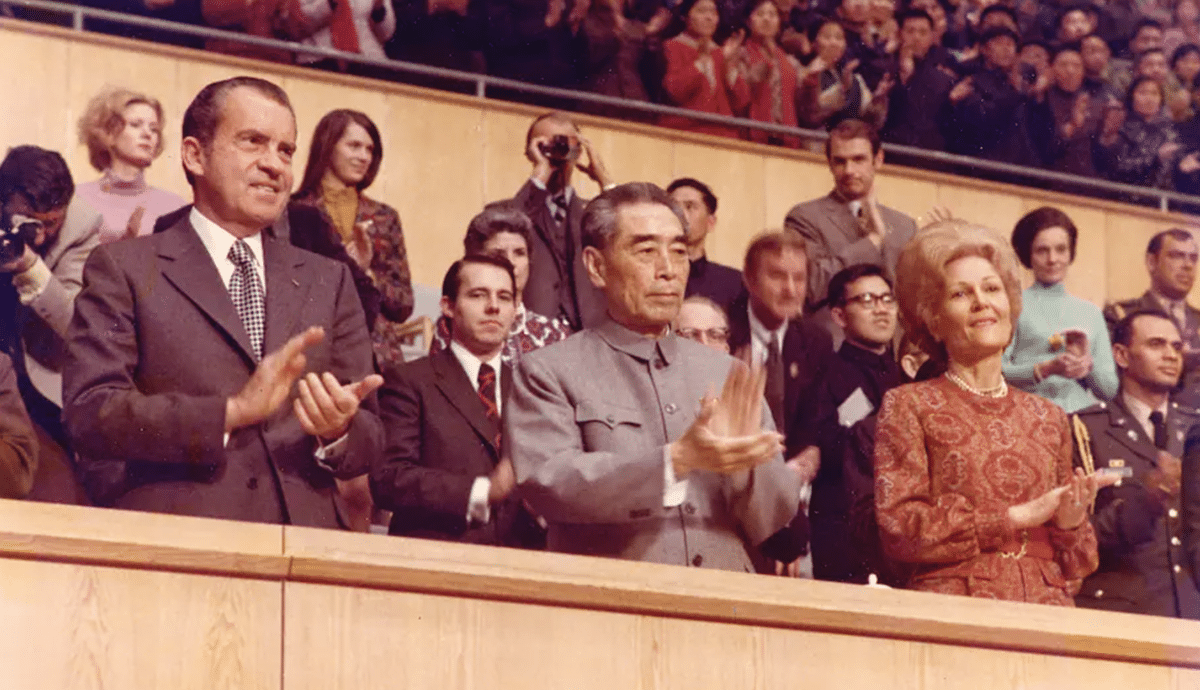
50 Years Since Ping-Pong Diplomacy
Watch on YouTube
Since 1949, clashing ideologies, regional conflicts, and opposing security and economic interests strained US-China relations. Yet, the 1971 World Table Tennis Tournament Championship in Nagoya, Japan, marked a turning point following a friendly encounter between table tennis players Glen Cowan and Zhuang Zedong from the US and the People’s Republic of China (PRC) teams.
The resulting ping-pong diplomacy and exchange of table tennis players between the United States and the PRC signaled progress in US-China relations. It eventually led to visits to the PRC by then-National Security Advisor Henry Kissinger in 1971 and US President Richard Nixon in 1972. In 1978, the two countries formally normalized relations.
Join us in commemorating 50 years since the start of ping-pong diplomacy as we look back on how this historic moment of sports diplomacy and cultural exchange transformed US-China diplomatic relations.
Meet the Panelists:
The Honorable Julia Chang Bloch (moderator): president of the US-China Education Trust, former US ambassador to Nepal, and former USAID assistant administrator of Food for Peace and voluntary assistance and assistant administrator for Asia and the Near East.
Mr. Robert Daly: director of the Wilson Center’s Kissinger Institute on China and the United States, former American director of the Johns Hopkins University-Nanjing University Center for Chinese and American Studies, and former cultural exchanges officer at US Embassy Beijing.
The Honorable Chas W. Freeman, Jr principal American interpreter during President Nixon’s 1972 visit to Beijing, former assistant secretary of defense for international security affairs, and former US ambassador to Saudi Arabia.
The Honorable J. Stapleton Roy: founding director emeritus of the Wilson Center’s Kissinger Institute on China and the United States; career ambassador with assignments in Singapore, the People’s Republic of China, and Indonesia; and former assistant secretary of state for intelligence and research.
For more information on our panelists, read their biographies.
Image: President Richard Nixon, Premier Zhou Enlai, and First Lady Pat Nixon at a table tennis exhibition in China in 1972 (Courtesy Richard Nixon Presidential Library and Museum).
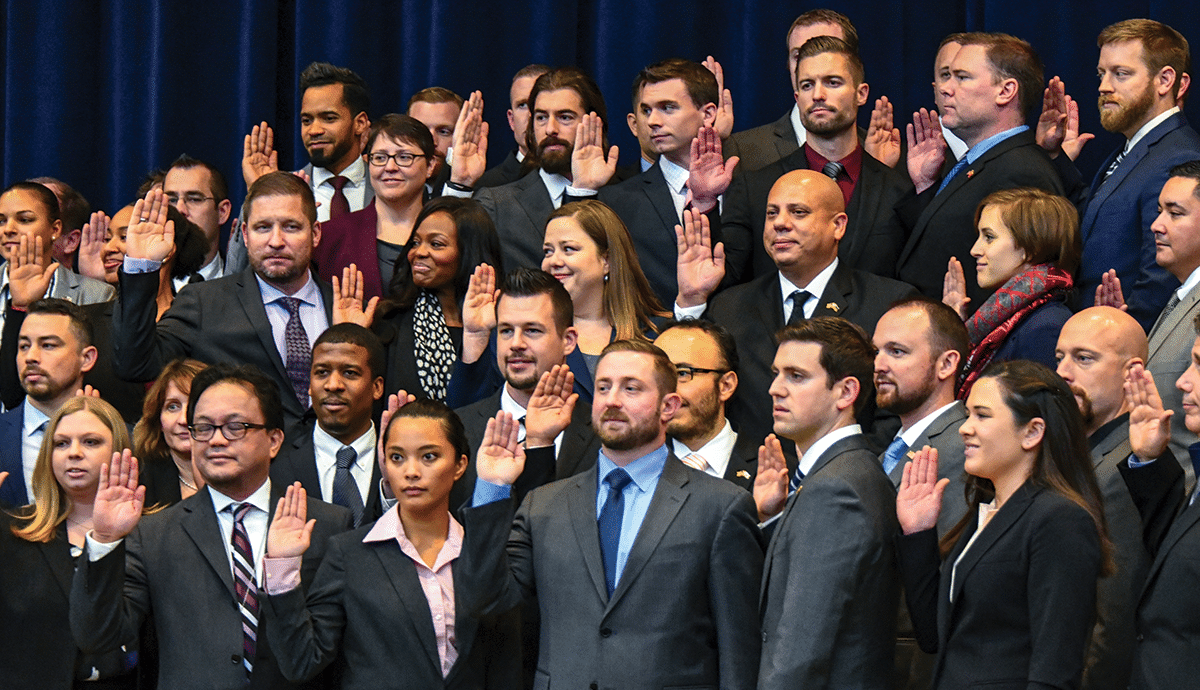
Inclusive Diplomacy: Former Directors General’s Perspectives
Virtual Conversation
Watch on YouTube
US Department of State officers and employees serve to formulate, articulate, and execute US foreign policy. Yet, the Foreign Service falls short of representing the diverse composition of the United States as racial and ethnic minorities are continually underrepresented, especially in senior positions. In taking notice of these inequities, the US Department of State has renewed its commitment to creating a more diverse and inclusive diplomatic workforce.
As head of human resources and talent management, the director general of the Foreign Service plays a leading role in the hiring, retention, and promotion of our nation’s diplomats. In conversation with Dr. Michael Krenn, former directors general of the Foreign Service will come together to share their experiences addressing issues of diversity and inclusion and discuss how the State Department can take action to create a more inclusive and equitable diplomatic workforce.
At the end of the conversation, Dr. Jane Carpenter-Rock, acting director of the National Museum of American Diplomacy, shares the Museum’s newest online project, “Facing Diplomacy.”
Meet the Panelists:
Michael Krenn, PhD (moderator): professor of history at Appalachian State University; author of six books, including The Color of Empire: Race and American Foreign Relations (2006).
The Honorable Arnold Chacon: director general of the Foreign Service (2014-2017) and US ambassador to Guatemala (2011-2014).
The Honorable Ruth A. Davis: director general of the Foreign Service (2001-2003), director of the Foreign Service Institute (1997-2001), and US ambassador to the republic of Benin (1992-1995).
The Honorable Edward Gnehm, Jr.: director general of the Foreign Service (1997-2000); US ambassador to Kuwait (1991-1994), Australia (2000-2001), and Jordan (2001-2004).
The Honorable Mattie R. Sharpless: director general of the Foreign Service, Foreign Agricultural Service (1989-1995); acting administrator of the Foreign Agricultural Service (2000-2001); US ambassador to the Central African Republic (2001-2003).
The Honorable Harry K. Thomas: director general of the Foreign Service (2007-2009); executive secretary to the Department of State (2005-2007); and US ambassador to Bangladesh (2003-2005), the Philippines (2010-2013), and Zimbabwe (2016-2018).
For more information on our panelists, read their complete biographies.

Women Navigating Weapons, Security, & Peace
Virtual Conversation
Watch on YouTube
Arms control and nuclear nonproliferation have been defining issues of US foreign policy throughout the 20th century and into today. Since the start of the Cold War, women diplomats have played an essential role in drafting, negotiating, and regulating global arms control and nonproliferation policies.
Join us in celebration of Women’s History Month as we explore the contributions of three women diplomats whose careers have advanced our understanding and practice of arms control and nuclear nonproliferation. In conversation with Ambassador Bonnie Jenkins, Ambassador Laura Kennedy, and Ambassador Eileen Malloy, we will discuss their experiences working on arms control, security, and peace issues and the advancements that are still needed to ensure that women and women of color have a seat at the table.
Meet the Panelists:
Reva Gupta (moderator): Foreign Service officer and former public affairs officer for the National Museum of American Diplomacy.
The Honorable Bonnie Jenkins: founder and executive director of the Women of Color Advancing Peace, Security, and Conflict Transformation (WCAPS); former coordinator for threat reduction programs.
The Honorable Laura Kennedy: former deputy assistant secretary for European and Eurasian affairs, former US ambassador to Turkmenistan and to the Conference on Disarmament, and former US special representative for Biological Weapons Convention issues.
The Honorable Eileen Malloy: former senior advisor to Secretary of Energy Bill Richardson; former deputy assistant secretary of state for European and Eurasian Affairs; former US ambassador to Kyrgyzstan; and former chief of arms control implementation unit at US Embassy Moscow.
For more information on our panelists, read their full biographies.
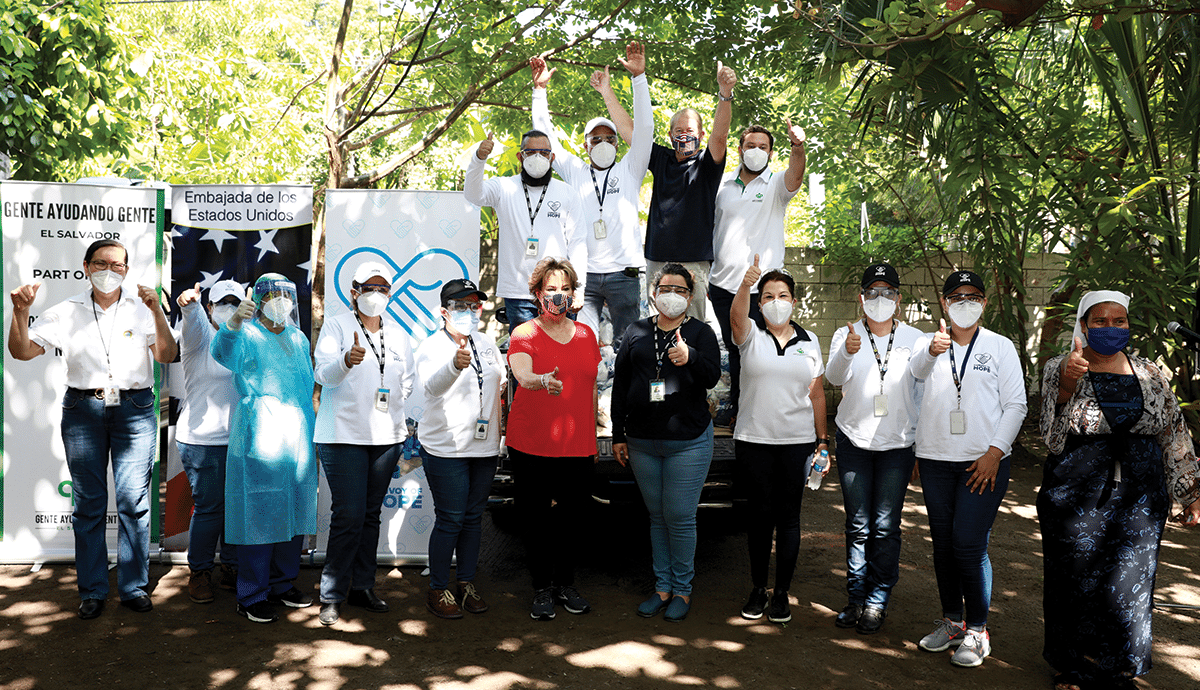
Diplomacy during a Health Crisis
Virtual Conversation
Watch on YouTube
The COVID-19 pandemic is one of the most significant global events of 2020. It has disrupted every nation, every industry, and each of our everyday lives. It has also transformed the work of US diplomats, who are part of the international response to the pandemic.
Yet, this is not the first time US diplomats are involved in tackling a global health crisis.
Looking back on the American diplomatic response to past health crises—from the HIV/AIDS global epidemic to the Ebola outbreak in West Africa—a panel of US diplomats discuss the experiences, challenges, and lessons learned from American diplomacy during a health crisis.
Panelists include:
The Honorable Thomas R. Pickering: career ambassador, having served as US Ambassador to the Russian Federation, India, Israel, El Salvador, Nigeria, and Jordan; former Under Secretary of State for Political Affairs; and current Vice Chairman of Hills and Company.
The Honorable Sally Cowal: career Foreign Service Officer, former US Ambassador to Trinidad and Tobago, and former Director of External Relations of UNAIDS.
The Honorable Alexander Laskaris: career Foreign Service Officer and former US Ambassador to Guinea.
Dr. Farley Cleghorn: Global Head of Health at Palladium and infectious disease epidemiologist who has been involved in the domestic and international coronavirus response.
Image: US Ambassador to El Salvador Ronald Johnson participates in the delivery of 64,000 pounds of food collected and sent by NGO People Helping People USA (Photographs Juan Quintero/Embassy of the United States/Office of Public Affairs).

Commemorating the 30th Anniversary of the Fall of the Berlin Wall
On November 9th, 1989, after 28 years of division between East and West Germany, residents of East Berlin began to peacefully cross into West Berlin. Serving as a global symbol of physical and ideological division, the fall of the Berlin Wall marked a significant moment in diplomatic history—a moment that was achieved as a result of diplomatic efforts by world leaders and diplomats.
Marking 30 years after the fall of the Berlin Wall, the Diplomacy Center Foundation hosted a commemoration at the National Museum of American Diplomacy (NMAD). The Commemoration featured a special conversation with the Honorable James A. Baker, III, whose tenure as the 61st US Secretary of State (1989-1992) coincided with the fall of the Wall, the end of the Cold War, and the reunification of Germany. In conversation with David M. Rubenstein, Secretary Baker touched upon his support of NMAD, his legacy as US secretary of state, and the state of American diplomacy today.
The Commemoration began with remarks from US Secretary of State Michael R. Pompeo, who announced the official name change from the US Diplomacy Center to the National Museum of American Diplomacy. Secretary Pompeo also touched upon his personal experiences in a divided Germany, having patrolled the East German border in Mödlareuth, Germany from 1986 to October 1989 with the US Army.
Her Excellency Emily M. Haber, Ambassador of the Federal Republic of Germany to the United States, represented the voice of the German people and remarked on the historical importance of US-German relations and the impact of American diplomats in creating a unified Germany and a more prosperous Europe. She noted that “without the United States and its visionary leaders, like James Baker, we would not celebrate the fall of the wall today.”
At the end of the Commemoration, Secretary Baker was presented with the Foundation’s inaugural Excellence in Diplomacy award. The award honors an individual or group with distinguished service in support of American diplomacy. Epitomized by the motto “Service, Leadership, Legacy,” the award recognizes the recipient’s service to the United States, leadership in advancing American diplomacy, and legacy for future generations.
As the US secretary of state, Secretary Baker’s skillful diplomatic efforts helped lead to the dissolution of the Soviet Union, the end of the Cold War, and the unification of Germany. He helped to overcome Cold War tensions and establish a brighter future in Europe and around the world. The benefits of his diplomatic accomplishment will be felt for generations. He serves as an inspiration for all current and future diplomats.
Throughout the evening, guests had the special opportunity to view NMAD’s new exhibit for the Signature Segment of the Berlin Wall. This 13-foot-high piece of the Wall was signed by 27 leaders who played a significant role in advancing German reunification. Guests were also the first to view the Diplomacy is Our Mission preview exhibition. Diplomacy is Our Mission focuses on diplomacy’s role in promoting the national security, economic prosperity, and global leadership of the United States. Created in partnership with Smithsonian Exhibits, Diplomacy is Our Mission uses storytelling, artifacts, and multimedia features to bring the untold stories of American diplomacy to life, from before our nation’s birth to today.
You can watch our Commemoration of the 30th Anniversary of the Fall of the Berlin Wall online thanks to CSPAN-3 American History TV. Watch now.
The Commemoration took place as part of the Wunderbar Together “Celebration of American German Relations.” The “Celebration of American German Relations” is part of the Deutschlandjahr USA 2018/2019 – Year of German-American Friendship. This initiative is funded by the German Federal Foreign Office, implemented by the Goethe-Institut, and supported by The Federation of German Industries (BDI).
Thank you to our event sponsors!
Platinum Sponsors
Chevron Corporation
General Dynamics Information Technology
The Honorable and Mrs. William C. Harrop
Gold Sponsors
Charles Black, Jr. and Curtis Grisham
Goldman Sachs
Silver Sponsors
Burt & Associates
Brandon Jundt

Founding Ambassadors Concourse Dedication
On May 8, 2019, the Diplomacy Center Foundation hosted a celebratory luncheon to dedicate the Founding Ambassadors Concourse. The Dedication was held in the newly dedicated Founding Ambassadors Concourse, located in the lower level of the 21,000 square foot glass entrance pavilion of the United States Diplomacy Center (USDC)* at the US Department of State.
This special dedication honored our Founding Ambassadors: individual donors who have received presidential appointments and donated $100,000 or more to the creation of the museum. To date, 66 Founding Ambassadors have raised a combined total of over $10 million. The Founding Ambassadors include two former US Secretaries of State, one former US Secretary of Defense, and 63 former US Ambassadors. The Founding Ambassadors initiative is chaired by Ambassador Stuart Bernstein (ret.), who also serves on the Foundation Board of Directors.
The Foundation welcomed more than 100 guests that included Founding Ambassadors, additional donors to the Foundation, and members of the diplomatic community. Ambassador William C. Harrop (ret.), Founding Ambassador and chair of the Foundation Board of Directors, offered the Dedication’s opening remarks. He recognized the significance of the occasion and thanked all those who support the creation of the Diplomacy Center, including Ambassador Elizabeth Frawley Bagley (ret.) for her efforts in raising the first $50 million for the Diplomacy Center.
Ambassador Harrop also spoke on the importance of American-German relations in light of the upcoming 70th anniversary of the end of the Berlin Airlift on May 12, 2019. The Dedication featured several objects from the Diplomacy Center’s collection that showcase decades of American-German relations. An Operation Vittles Cookbook was one of the objects exhibited. The Operation Vittles Cookbook was compiled by American women during the 1949 Berlin Blockade to create recipes using the limited resources available to them. The Foundation was grateful to have Boris Ruge, Deputy Chief of Mission of the Federal Republic of Germany, in attendance at the Dedication.
The Foundation was also honored to welcome Ambassador Thomas R. Pickering (ret.), who is a Founding Ambassador and vice-chair of the Diplomacy Center Foundation Board of Directors. Ambassador Pickering’s remarks touched on the crucial role American diplomacy plays in advancing prosperity in the US and around the world. He also thanked guests for their support “in this particular endeavor of telling Americans what diplomacy does for them and what they can do for diplomacy.”
Speakers also included Diplomacy Center Director Mary Kane. Mrs. Kane spoke about the outstanding education programs currently available at the Diplomacy Center and updated guests about the ongoing exhibit planning for the Diplomacy Center.
Ambassador Stuart A. Bernstein (ret.) concluded the Dedication by emphasizing the importance of diplomacy in maintaining a peaceful international order and the need to communicate this message through a museum dedicated to American diplomacy. He stated, “There are hundreds of museums that are dedicated to military and war–over 400–and not a single one to diplomacy. […Therefore,] when Ambassador Elizabeth Frawley Bagley asked me to support the building of this museum, I did not hesitate.” In his closing remarks, Ambassador Bernstein officially dedicated the space to the Foundation Ambassadors.
The Diplomacy Center Foundation would like to thank all our guests for attending this special dedication. We also extend our deepest thanks and gratitude to our Founding Ambassadors for their generous contributions and support for creating the first museum dedicated to telling the story of American diplomacy.
The Founding Ambassadors Concourse Dedication took place as part of the Wunderbar Together “Celebration of American German Relations.” The “Celebration of American German Relations” is part of the Deutschlandjahr USA 2018/2019 – Year of German-American Friendship. This initiative is funded by the German Federal Foreign Office, implemented by the Goethe-Institut, and supported by The Federation of German Industries (BDI).
*On November 5, 2019, the US Diplomacy Center formally changed its name to the National Museum of American Diplomacy.

Legacy Ministers Launch
The Diplomacy Center Foundation launched the Legacy Ministers appeal initiative on July 20, 2018. The appeal launch was held at the Founding Ambassadors Concourse in the United States Diplomacy Center* entrance pavilion. Remarks were made by special guests Deputy Secretary of State John Sullivan and Hany Hassan, FAIA, Partner of Beyer Blinder Belle Architects and Planners.
Diplomacy Center Director Mary Kane and Ambassador William C. Harrop (ret.), Chair of the Diplomacy Center Foundation Board of the Directors, briefly spoke at the beginning of the program. James T. L. Dandridge, II from the Foundation Board of Directors introduced the Legacy Ministers initiative. The program was followed by a reception upstairs in the Diplomacy Center entrance pavilion. The reception was attended by 135 individuals, including over 100 guests from the Foreign Service community.
Learn more about the Foundation’s Legacy Ministers appeal.
* On November 5, 2019, the United States Diplomacy Center formally changed its name to the National Museum of American Diplomacy.

Friend-Raising Reception
On March 22, 2018, Ambassador Barbara Barrett (ret.) and Amb. Brenda LaGrange Johnson (ret.) co-hosted an evening reception at Sanctuary Camelback Mountain Resort in Paradise Valley, Arizona. The reception openings with remarks from Foundation Chair Amb. William C. Harrop (ret.). Amb. Harrop spoke about the Foundation’s partnership with the United States (US) Department of State to build the Diplomacy Center*, as well as the Diplomacy Center’s mission to educate the public on the work of Foreign Service Officers and others in the diplomatic community. Foundation Vice President Amb. Roman Popadiuk (ret.) further elaborated on the Foundation’s capital campaign and introduced keynote speaker Dan Quayle, 44th Vice President of the United States.
In his remarks, Vice President Quayle shared several stories from his time in office as Vice President and recounting his experiences serving on the Senate Foreign Relations Committee. Vice President Quayle also expressed the importance of dedicating a museum to diplomacy, so that current and future generations can be educated about the history of American diplomacy and understand the ongoing role of diplomats in our ever-changing world. Vice President Quayle said, “Since the founding of our nation, diplomacy has been a key tool in furthering our national security and our economic growth and in addressing international crises. Through its exhibits and programs, the United States Diplomacy Center will help educate future generations about the important role of American diplomacy. I am delighted to see that steps are being taken to recognize this important part of our national legacy.”
*On November 5, 2019, the United States Diplomacy Center formally changed its name to the National Museum of American Diplomacy.

























